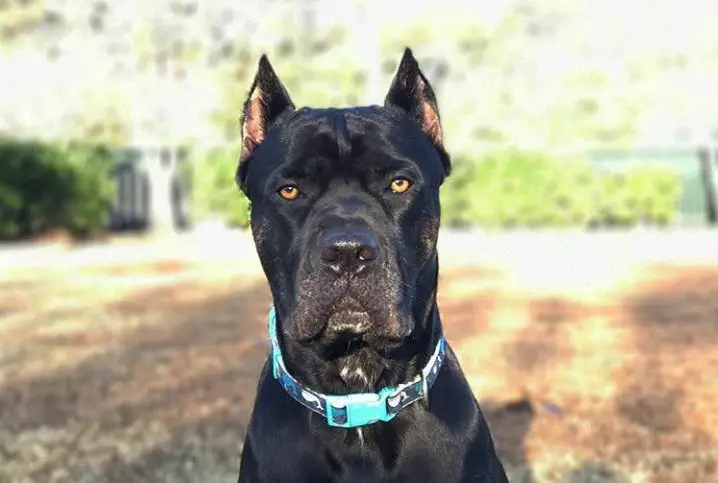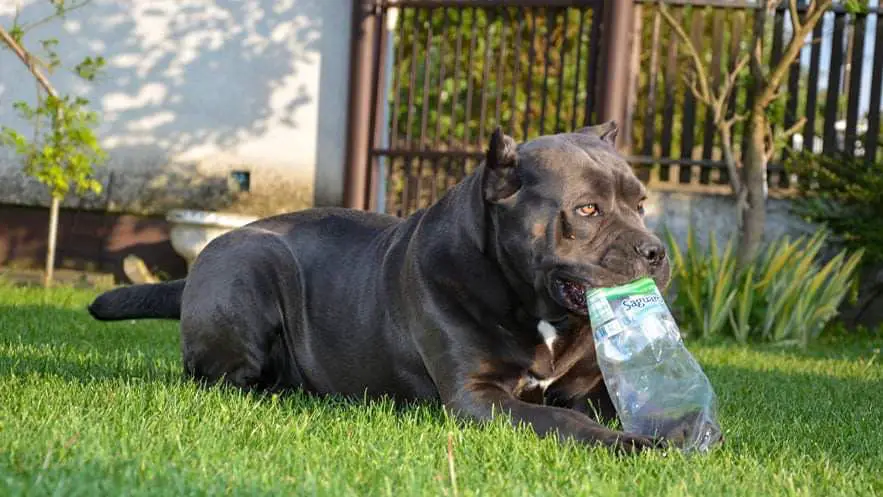Choosing a Cane Corso as a family pet can be a rewarding experience, but a crucial choice you’ll face is deciding if your Cane Corso should live inside or outside.
This choice significantly influences your dog’s lifestyle and the development of its character.
In this article, we’ll explore the advantages and disadvantages of housing a Cane Corso outside compared to inside, helping you to make an informed decision that suits your pet best.
Key Takeaway
- While a Cane Corso can tolerate being outside for periods of time, they are social animals that thrive on human companionship and should not be kept outside full-time, as it can lead to behavioral problems.
- Some Cane Corso owners may keep them outside all day to provide them with ample space for exercise and play, but it’s important to note that this breed is social and thrives on companionship, so extended periods alone outdoors can lead to behavioral problems.
- Keeping a Cane Corso outside for prolonged periods can lead to negative effects such as weather-related discomfort, potential lack of water and food, along with the breed’s need for mental stimulation and social interaction being unmet, potentially leading to destructive behavior.
- The Cane Corso thrives in moderate temperatures, ideally ranging from 43 to 58 degrees Fahrenheit (6 to 14 degrees Celsius), as their short coat is more adapted to warmer weather and they may struggle with extreme hot or cold conditions.
Can a Cane Corso Be Kept Outside?

Cane Corsos, while they can be kept outside, generally should not be, especially not as their primary living space.
This breed is sensitive to extreme weather due to their short coat, struggling in both very cold and hot temperatures.
Therefore, if they are to spend time outdoors, it’s crucial they have access to appropriate shelter to protect them from the elements.
More importantly, Cane Corsos are highly social animals that require regular interaction with their human family.
Isolating them outdoors can lead to a range of behavioral problems stemming from loneliness and boredom.
They thrive best when they are part of the household, engaging regularly with their owners and participating in family activities.
Why Do Cane Corso Owners Keep Them Outside All Day?
Shedding and Cleanliness
Many Cane Corso owners choose to keep their dogs outside due to the breed’s shedding, especially during spring. The short coat of a Cane Corso sheds, and keeping them outdoors is sometimes seen as a way to maintain a cleaner home environment.
Destructive Behavior
Cane Corsos, particularly in their younger, more formative years, can exhibit destructive behaviors. Owners might find their belongings chewed or torn apart. To avoid such damage, some opt to keep their dogs outside during the day.
Guilt Over Indoor Confinement
Owners who work long hours may feel guilty about leaving their Cane Corso confined indoors. Concerned about the dog’s well-being and need for space, they may decide that keeping the dog outside is a better option.
Misconceptions About Dog’s Needs
Some owners might mistakenly believe that Cane Corsos, being large and robust dogs, are better suited for outdoor living. This misconception can lead to the decision to keep them outside, not fully considering the breed’s need for social interaction and environmental sensitivity.
Lack of Awareness
Finally, a lack of awareness about the breed’s specific needs and temperament can lead some owners to keep their Cane Corsos outside. Understanding the breed’s characteristics and needs is crucial for providing the appropriate care and environment.
Negatives of Keeping Your Cane Corso Outside
While letting your Cane Corso outside for a bathroom break is not bad, keeping them outside day and night can be very bad for them.
There are a lot of bad behaviors that will present when a dog is left unattended. Then, there are the possible health issues. I came up with a list of the negatives of keeping your Cane Corso outside:
Weather conditions
The Cane Corso is not built for cold weather. This breed has a short coat that does not provide much insulation against the cold. In addition, the Cane Corso does not have a lot of body fat to help keep it warm in colder climates.
For these reasons, it’s best to keep your Cane Corso inside where it’s warm and comfortable. Cane Corso can get too hot or too cold depending on the weather outside. If it’s extremely hot or extremely cold can both be hard on your dog, especially if they are outside all day.
Lack of water and food
It is easy for a dog to be left without water and food. This doesn’t mean that you will forget to bring them water and food.
No, this means that they can easily tip over the food and water bowl and you won’t notice. And you know that you just brought them food and water and the next refill is due in five or six hours.
Need human interaction
The Cane Corso is very social and needs human interaction to thrive. This breed forms strong bonds with its family and does not do well when left alone for long periods of time.
If you’re gone all day, your Cane Corso will likely become bored and destructive. A bored Cane Corso might start digging a hole under the fence in order to escape the boredom.
Health issues
The Cane Corso is prone to health problems that can be made worse by living outdoors. This breed is susceptible to hip dysplasia, a condition that can be exacerbated by cold weather and lack of exercise.
In addition, the Cane Corso is also prone to heatstroke, so it’s important to keep this breed cool and out of the sun during hot summer months.
No mental stimulation
Unless you have a backyard with water slides, mazes, and lots of other pets, the Cane Corso won’t have mental stimulation. They will become bored very fast.
They could turn into loud barkers
The Cane Corso won’t like the idea of being outside alone for days. They can easily turn into loud barkers to get attention. The barking can annoy both you and the neighbors.
What Weather is Best For Cane Corso?

The Cane Corso thrives best in moderate weather conditions. This breed, with its short coat, is not well-equipped for extreme temperatures, whether hot or cold.
In very cold weather, the lack of a thick, insulating coat means they can easily become too cold, necessitating additional warmth through shelter or clothing.
Conversely, in hot climates, Cane Corsos can suffer from overheating due to their size and coat type.
They enjoy sunbathing but are susceptible to sunburn, so providing shade and ensuring they have access to cool, fresh water is essential.
Additionally, they are fond of water activities, which can be a great way to help them stay cool in warmer temperatures.
Overall, a temperate climate, where it’s neither too hot nor too cold, suits the Cane Corso best, allowing them to enjoy outdoor activities comfortably while maintaining their health and well-being.
Do Cane Corsos Do Well in The Heat?
Cane Corsos, with their short coats, can manage in warm weather, but they do not fare particularly well in extreme heat.
Their large size and muscular build can make them more susceptible to overheating. In high temperatures, these dogs require special care to ensure they remain comfortable and healthy.
It’s crucial to provide them with ample shade and continuous access to fresh water to prevent dehydration.
Activities in the heat should be limited, especially during the hottest parts of the day, and owners should watch for signs of heat exhaustion, such as excessive panting or lethargy.
Cane Corsos enjoy swimming, which can be an excellent way for them to cool off in warmer weather.
However, it’s important to remember that like all dogs, they need to be monitored closely in hot conditions to prevent heat-related health issues.
FAQs
Q: Is the Cane Corso a good outdoor dog?
A: The Cane Corso is known to be a good outdoor dog as long as they have adequate space, shelter, and socialization.
Q: How should I prepare my outdoor space for a Cane Corso?
A: To prepare your outdoor space for a Cane Corso, make sure you have a securely fenced area, provide a comfortable and shaded space for them to rest, and ensure they have access to fresh water at all times.
Q: Do Cane Corsos require a lot of exercise?
A: Yes, Cane Corsos are an active and energetic breed that requires regular exercise to stay healthy and happy. Daily walks, playtime, and mental stimulation are important for their well-being.
Q: Can I leave a Cane Corso alone in the backyard for long periods?
A: It is not recommended to leave a Cane Corso alone in the backyard for long periods as they are social animals and thrive on companionship. They may become bored, anxious, or develop behavioral issues if left alone for extended periods.
Q: How should I ensure my Cane Corso’s safety when kept outside?
A: To ensure your Cane Corso’s safety when kept outside, make sure the fencing is secure and tall enough to prevent them from escaping. Regularly check for any hazards in the area and provide them with a comfortable shelter that protects them from extreme weather conditions.
Q: Should I leave my Cane Corso outside during extreme weather?
A: No, it is not recommended to leave your Cane Corso outside during extreme weather conditions such as extreme heat, cold, or storms. They can suffer from heatstroke, hypothermia, or other weather-related health issues. It is best to bring them indoors during such conditions.
Q: Can a Cane Corso adapt to different climates when kept outside?
A: Cane Corsos can adapt to different climates when kept outside, but it is important to provide them with appropriate shelter and protection. In colder climates, they may require additional insulation or heated shelter, while in hotter climates, access to shade and fresh water is essential.
Q: Can I train a Cane Corso to be well-behaved when kept outside?
A: Yes, Cane Corsos are intelligent and trainable dogs. It is important to start their training from a young age and be consistent with positive reinforcement methods. Proper socialization and obedience training can help them become well-behaved when kept outside.
Q: Are there any specific health concerns when keeping a Cane Corso outside?
A: When keeping a Cane Corso outside, it is important to monitor for any signs of heatstroke, frostbite, or other weather-related health issues. Regular vet check-ups, proper vaccinations, and parasite prevention are essential to maintain their overall health and well-being.
Conclusion and final thoughts
In conclusion, the Cane Corso can be an ideal breed of dog to keep outside.
These dogs are highly intelligent and loyal to their owners, making them excellent guard dogs or companions in the outdoors.
Their thick coats and muscular build make them well-suited for cold weather climates.




